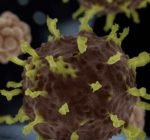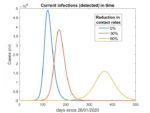Scientists using the world’s most powerful supercomputer, the Arm-based Fugaku system at Japan’s Riken Center for Computational Science, have generated findings that relate humidity to the spread of coronavirus: the more humid the air, the lesser the aerosol spread. In a story published by Reuters yesterday, it was reported that the “supercomputer showed that humidity […]
Los Alamos Stands up HPE Cray EX for COVID-19 Fight
Los Alamos National Laboratory reported it has completed the installation of “Chicoma,” based on AMD EPYC CPUs and the HPE Cray EX supercomputer architecture. The HPC platform is aimed at enhancing the lab’s R&D efforts in support of COVID-19 research. Chicoma is an early deployment of HPE Cray EX, which offers a large-scale system architecture […]
Insilico Medicine Launches AI-powered COVIDomic for COVID-19 Research
Santa Clara, CA – Insilico Medicine, a leader in artificial intelligence for drug discovery and development, announced the launch of a system for COVID-19 basic and clinical research. COVIDomic is a foundational technology that enables scientists to use anonymized patient data to integrate with a variety of existing data sets. Bioinformatics and AI tools can […]
SC20 General Chair: We’re Planning for In-Person and Virtual Conference
SC20, scheduled for November 15-20 in Atlanta, is in the throes of planning for this year’s conference amidst the global COVID-19 pandemic – and conference General Chair Christine E. Cuicchi today said that in the months since the coronavirus outbreak, “the SC20 committee began planning for both in-person and virtual attendance.” Noting that open registration for the conference will begin on August 14, Cuicchi also said the conference planning committee will provide updates (here) on the event’s status as the course of the pandemic unfolds.
Anton 2 at PSC for Coronavirus Binding Simulation, COVID-19 Test Development
A team at the University of Arkansas is using the Pittsburgh Supercomputing Center’s Anton 2 system to simulate molecular systems for microseconds or longer to investigate how the Coronavirus that causes COVID-19 attaches to human cells, PSC reported. Anton 2, developed by privately held D. E. Shaw Research (DESRES) of New York, is a special-purpose, […]
COVID Camouflage: TACC’s Frontera Reveals Virus’s ‘Sugar Coating’
Researchers using the Frontera supercomputer at the Texas Advanced Computing Center (TACC) have uncovered the atomic makeup of the sugary shield on the coronavirus that could prove instrumental to the workings of the contagion, now spreading death, illness and economic destruction around the world. UCSD scientists have used about 2.3 million Frontera node hours for molecular dynamics simulations and modeling.
GCS Centres in Germany support COVID-19 research with HPC
Epidemiologists have turned to the power of supercomputers to model and predict how the disease spreads at local and regional levels in hopes of forecasting potential new hot spots and guiding policy makers’ decisions in containing the disease’s spread. GCS is supporting several projects focused on these goals. “”Our workflows are perfectly scalable in the sense that the number of calculations we can perform is directly proportional to the number of cores available.”
New Gordon Bell Special Prize announced for HPC-Based COVID-19 Research
Today ACM announced the inception of the ACM Gordon Bell Special Prize for HPC-Based COVID-19 Research. The new award will be presented in 2020 and 2021 and will recognize outstanding research achievements that use high performance computing applications to understand the COVID-19 pandemic, including the understanding of its spread. Nominations will be selected based on performance and innovation in their computational methods, in addition to their contributions toward understanding the nature, spread and/or treatment of the disease.
Adaptive Computing frees up Cloud HPC for researchers fighting COVID-19
Adaptive Computing is now making HPC access available for anyone working on COVID-19 related projects. Adaptive’s NODUS Cloud OS solution makes it simple to scale computing resources to your workloads and run compute intensive models and simulations from remote locations. Adaptive Computing is providing temporary software licenses to researchers and scientists who are currently working […]












